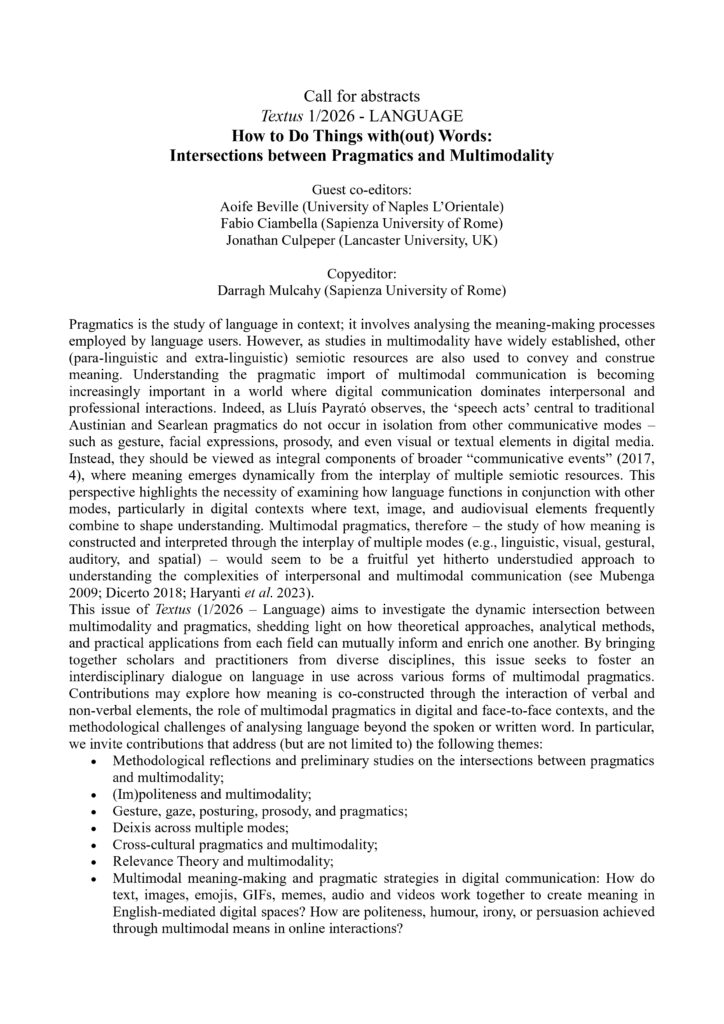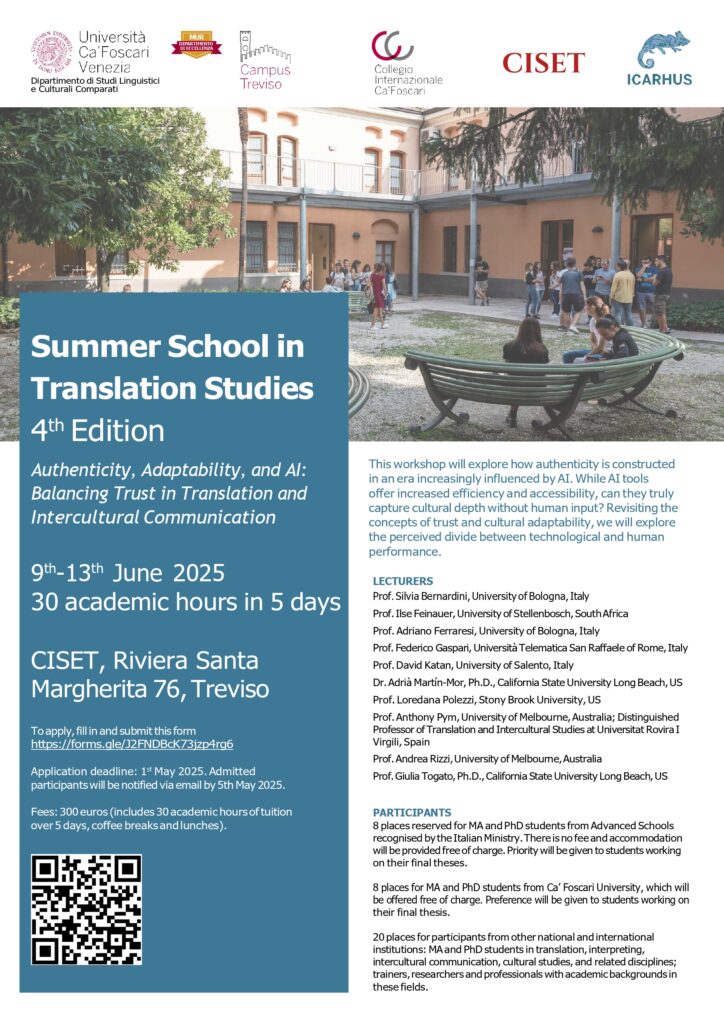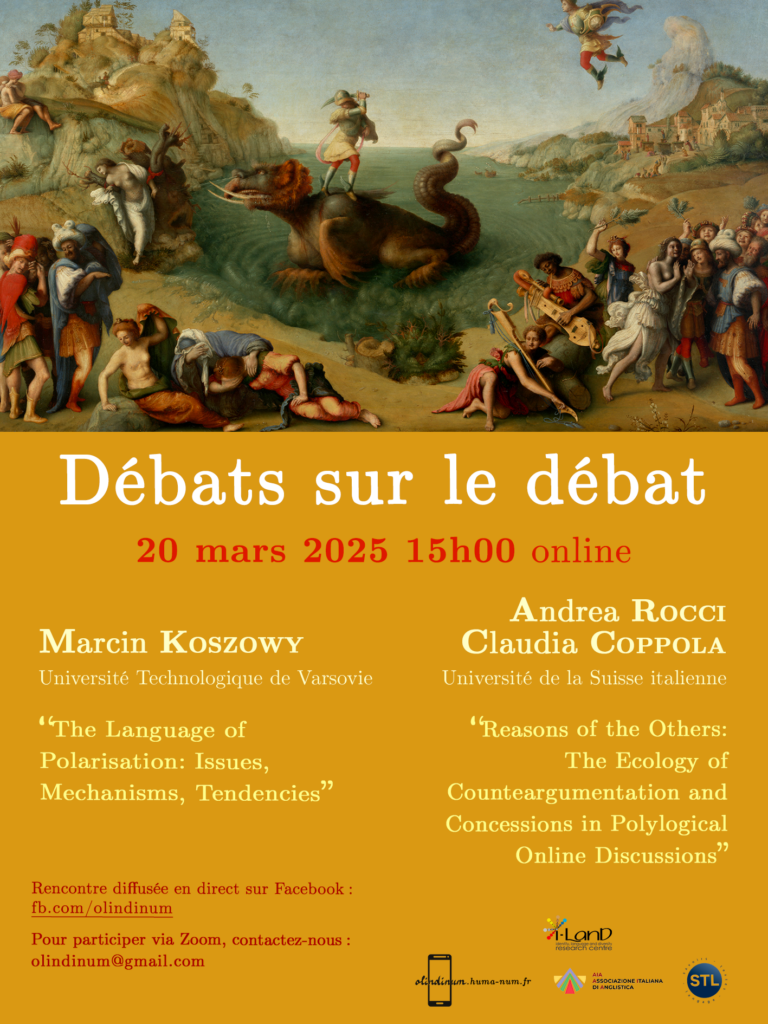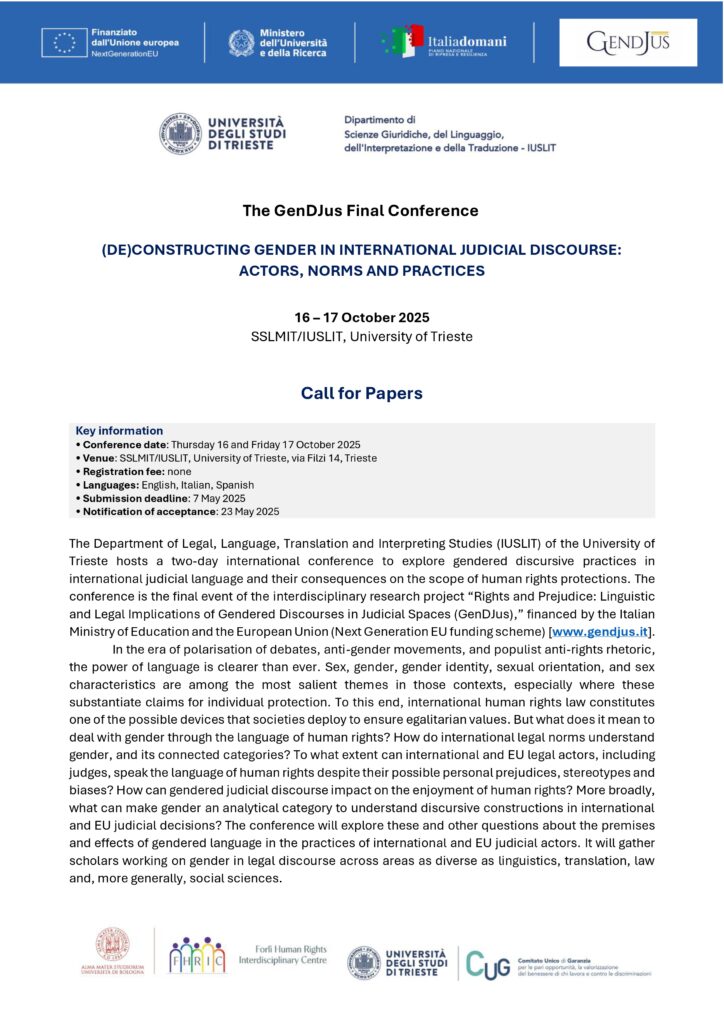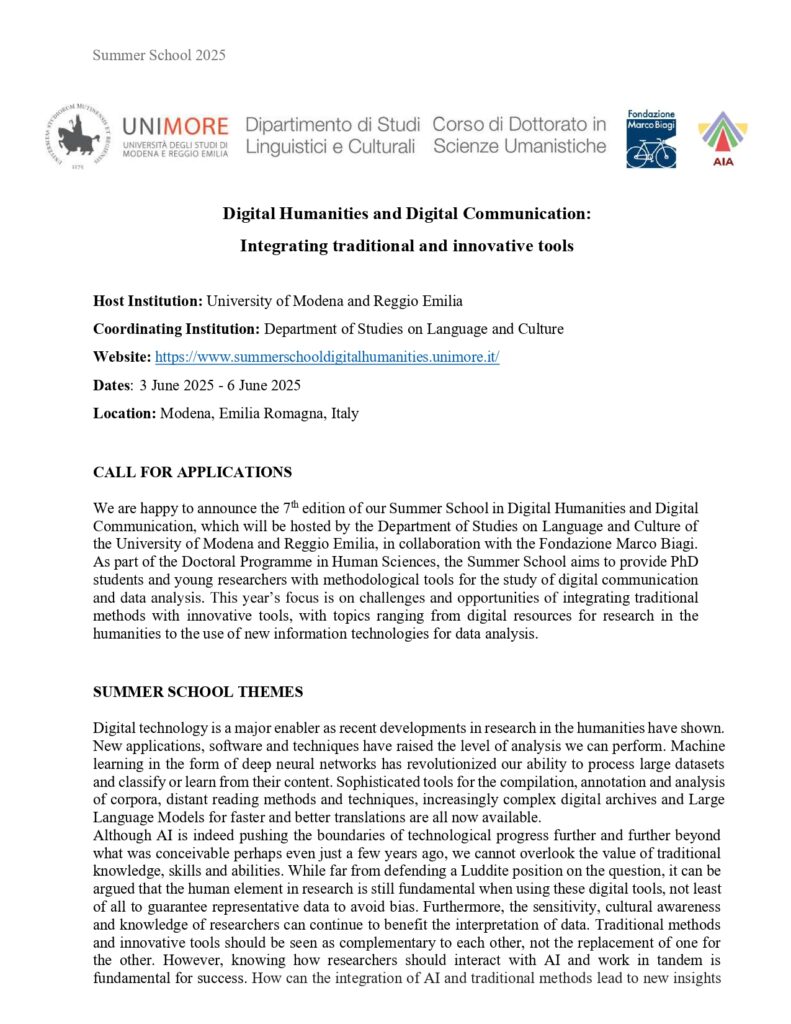Call for abstracts Textus 3/2026 – CROSS-DISCIPLINARY ISSUE
Voices Across Borders: Reframing the Barriers of Vulnerability in Language, Culture, and Literature Guest co-editors: Gaetano Falco (Università degli Studi di Bari “Aldo Moro”) Elena Spandri (Università degli Studi di Siena) Jun Pan (Hong Kong Baptist University) Copyeditor: Eileen Mulligan (University of Bari) In an increasingly hostile transnational political climate and environment, where current sweeping policy-making bodies demonize notions and practices of diversity, equity, and inclusion, fostering division within and between societies, nation-states, and cultures, the need to encourage inclusive dialogue in academic research has never been more pressing. By reframing the barriers of vulnerability in all its forms—whether linguistic, cultural, social, and digital, or in their literary representation— this issue of Textus intends to construct a comprehensive and vibrant space for scholarly investigation and social change, encouraging interdisciplinary conversation. Vulnerability is a concept that usually implies the related ideas of fragility, inequity, and risk, but is also associated with resilience, empowerment and resistance (Butler 2014). It “is a concept with fleeting contours as much as it is an idea with assured academic success” (Ferrarese 2016:149). As such, it is characterized by indeterminacy and variability, which accounts for the current, “increasingly multidisciplinary interest in the topic.” (Nungesser and Schirgi 2024: 252). Over the last decades, the notion has gained the attention of various research areas, both embracing and articulating its conceptual boundaries, as the idea itself has been subject to reconceptualization in the field of international human rights law (Morawa 2003). The call for Voices Across Borders offers itself to multiple inflections, showcasing the need for change and empowerment as a key quality that underlies recent developments in the fields of – amongst others – (critical) discourse analysis, literary studies, cultural studies, (critical) disability studies, gender studies, environmental studies, migration, border discourse and cultural mediation, and museum studies. Among the possible angles, one may consider for instance exploring the pliability of the novel form to contemporary ‘humanitarian imaginary’ in the current context marked by a pervasive condition of conflict, the massive experience of vulnerability and mediatic exposure to violence (Ganguly 2016). Another option may be to consider the dual role of language as both a barrier and a bridge across various fields, including translation and communication (Davies 2012); or, as a resource for inclusion and a cause of exclusion of vulnerable groups, ranging from migrants to refugees and asylum seekers (Schrover and Schinkel, 2013), to women and LGBTQI+ people (Jones 2023). The papers selected will ideally address the core topic from either theoretical or applied and text-focussed perspectives, in literature, linguistics, and cultural studies, including discussion of best practices in teaching and other professional experiences. References Antinucci, Raffaella, and Adrian Grafe (eds.). Vulnerability and Resilience in English Literature of the Long Nineteenth Century (McFarland, 2024). Bonacchi, Silvia, ed. Vulnerability: Real, Imagined, and Displayed Fragility in Language and Society. Göttingen: Vandenhoeck & Ruprecht unipress, 2024. Butler, Judith. “Introduction: On Linguistic Vulnerability.” In Excitable Speech: A Politics of the Performative. New York: Routledge, 1997: 1-42. Butler, Judith. “Rethinking Vulnerability and Resistance.” In Judith Butler, Zeynep Gambetti, and Leticia Sabsay (ed. by), Vulnerability in Resistance, Duke UP, 2016, pp.12-27. Butler, Judith, Precarious Lives: The Powers of Mourning and Violence (Verso, 2006). Cunningham, Clare, and Christopher J. Hall, eds. Vulnerabilities, Challenges and Risks in Applied Linguistics. Bristol: Multilingual Matters, 2021. Davies, Eirlys E. “Translation and Intercultural Communication: Bridges and Barriers.” In C. B. Paulston, S. F. Kiesling, & E. S. Rangel (Eds.), The Handbook of Intercultural Discourse and Communication. Wiley-Blackwell 2012, pp. 367–387. De Vogli R., Lusiardi M. (2024) “The Ecological Crisis and Human Rights: Why We Are All Vulnerable ” Peace Human Rights Governance, 8(1), 135-152. Ferrarese, Estelle. “Vulnerability: A Concept with Which to Undo the World As It Is?”. Critical Horizons, 17, 2 (2016): 149-159. https://doi.org/10.1080/14409917.2016.1153885 Fernández-Santiago, Miriam, and Cristina M. Gámez- Fernández (eds.). Representing Vulnerabilities in Contemporary Literature (Routledge, 2022). Ganassin, Sara, Alexandra Georgiou, Judith Reynolds, and Mohammed Ateek. 2024. “Vulnerability and Multilingualism in Intercultural Research with Migrants: Developing an Inclusive Research Practice.” Language and Intercultural Communication 24 (5): 385–93. doi:10.1080/14708477.2024.2411083. Ganguly, Debjani, This Thing Called the World. The Contemporary Novel as Global Form (Duke UP, 2016). Ganteau, Jean Michel. The Ethics and Aesthetics of Vulnerability in Contemporary British Fiction (Routledge, 2015). Giladi, Paul, and Petherbridge, Danielle. “The Vulnerable Dynamics of Discourse”. Royal Institute of Philosophy Supplement. 2021: 195-225. doi:10.1017/S1358246121000151 Heikkilä, Mikaela, and Maija Mustaniemi-Laakso. “Introduction: Approaches to Vulnerability in Times of Crisis.” Human Rights Review (2023) 24:151–170. Jones, Lucy, “Language, gender and sexuality in 2022”, Gender and Language, 17, 2 (2023): 1-18. Lewis, Hannah, Precarious Lives: Forced Labour, Exploitation and Asylum (Policy Press, 2014). Morawa, Alexander E., “Vulnerability as a Concept of International Human Rights Law”, Journal of International Relations and Development 6, 2 (June 2003): 139-155. Nixon, Rob, Slow Violence and the Environmentalism of the Poor (Harvard UP, 2011). Nungesser, Frithjof, and Antonia Schirgi. “Debating the Vulnerability Zeitgeist: Introduction to an Interdisciplinary Trialogue.” Human Studies, 47, 2 (2024): 251–260. Scarry, Elain, The Body in Pain: The Making and Unmaking of the World (OUP, 1985). Schrover, Marlou, and Willem Schinkel. “Introduction: the language of inclusion and exclusion in the context of immigration and integration”, Ethnic and Racial Studies 36, 7 (2013): 1123-1141. Slaughter, Joseph R., Human Rights, Inc. The World Novel, Narrative Form, and International Law (Fordham UP, 2007). Wu, Duncan, and Carolyne Forché (eds.) Poetry of Witness: The Tradition in English 1500-2001 (Norton, 2014). Submission of abstracts Please send abstracts to: gaetano.falco@uniba.it, Timeline Deadline for abstracts submission (400 words plus references): 15 December 2025. Please put as subject line “Textus Cross-disciplinary Issue 6/2025 – abstract submission” Notification to authors: 15 January 2026 Deadline for submission of first draft of article (maximum 7500 words including references): 31 May 2026 Request for revisions following peer review: 15 July 2026 Deadline for final version of article: 1 September 2026
Call for abstracts Textus 3/2026 – CROSS-DISCIPLINARY ISSUE Read More »

